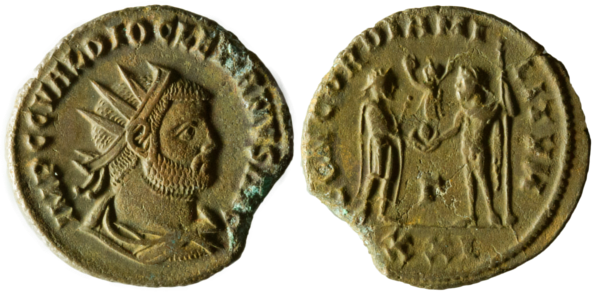
November 20, 2014, by Esther Eidinow
On this day, 20 November, in AD 284, Diocletian became Roman emperor.
As part of the Nottingham ‘Anniversaries through Coins’ project, Lois Howorth, a first-year Classics student describes the rise to power of Gaius Aurelius Valerius Diocletianus (usually known simply as Diocletian).
Diocletian began life very humbly. The future emperor was originally named Diocles and came into the world in 240 or 244 on the Dalmatian coast. His father had worked as the scribe of a wealthy senator, possibly even as a slave, and critics went so far as to say that Diocletian may have even been a freedman himself. He was shrewd though, and sought and found betterment through the military.
Crisis thundered through the Roman empire during this period, lasting from 235 to 284 (ending with Diocletian’s accession). Civil wars between armies had broken out, with different armies offering up their general to become a new emperor. The arguments had caused such vulnerability that the Roman Empire had begun to find itself struggling with invasions from the Franks, Alamanni, Goths, and eastern Sassanid Persians.
It was through this world that Diocletian climbed. Though it is difficult to state Diocletian’s precise route to this position, he is said to have fought border defence on the banks of the Danube (as dux Moesia), and been an able and ambitious man seeking victory over glory. In 282 was made commander of the protectores domestici, a cavalry force attached to the emperor Carus’ household. The following year Diocletian found himself a consul.
Carus prosecuted a war against the Persians. Mid-war, the emperor was struck by lightning and died, freeing up his son Numerian to ascend. The most common story of Carus’ death is that he was struck by lightning while at Ctesiphon. Whatever the case Numerian’s join rule with his brother Carinus soon suffered a similarly abrupt end.
Numerian had lingered in the East whilst elder Carinus raced back to Rome, Numerian only reaching Emesa in Syria in 284. As Numerian left the city, his praetorian prefect and father-in-law Aper reported that Numerian was complaining of inflamed eyes. Numerian began to travel in a closed litter for safety. Soon after, a strange smell wafted from the carriage, and in Bithynia men opened it to be greeted by a corpse. It was described by Eutropius (a historian) as murder; was the culprit Diocletian? He blamed Aper following his accession as emperor through the powers of a council of generals and tribunes. By the hand of Diocletian, apparently quoting Virgil if the Historia Augusta can be believed, Aper was butchered in full-view of the troops. Diocles upgraded his name to the more Latinate Gaius Aurelius Valerius Diocletianus soon after.
Image by Kelly Grimshaw: AE 20 of Diocletian. Obverse has radiate, draped bust right, obverse inscription IMP CC VAL DIOCLETIANVS PF AVG. Reverse has Emperor r. receiving Victory from Jupiter, reverse inscription CONCORDIA MILITVM / GAMMA / XXI. 20mm, 3.59g, 12 o’clock.
No comments yet, fill out a comment to be the first

Leave a Reply